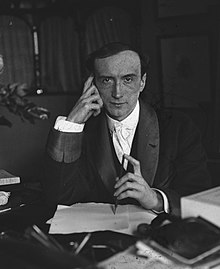Henry Bataille
Henry Félix Achille Bataille (born April 4, 1872 in Nîmes , France ; † March 2, 1922 in Rueil-Malmaison in his possession “Vieux Phare”, German “old lighthouse”) was a French poet and playwright . Century a popular tabloid playwright ( comedies ).
Bataille came from a middle-class family that had its origins in the Aude department. His mother, Alice Mestre-Huc, had family ties in Moux , his father Léopold Bataille in Castelnaudary , Lauragais . In 1876, Bataille's father was appointed magistrate to the Paris Court of Appeal. The Parisian battalions were unfortunate. The untimely death of his father in 1883 caused his mother to direct all of her crushing affection towards Henry. She passed away two years later. Bataille was raised by his sister and her husband, Ernest Blagé.
A chaotic school career and good drawing skills brought young Henry to the Académie Julian . For a long time he thought of devoting himself entirely to painting. In this context he published an album of lithographs in 1901 under the title "Têtes et pensées" (Heads and Thoughts), in which we can find portraits of celebrated writers from the beginning of the 20th century (e.g. Jules Renard , André Gide ... ). At the same time, however, he was also interested in writing. He put his first poems on paper as early as 1887. He wrote the first parts of the play "La Lépreuse" in 1892. In 1893 Bataille designed the framework for "La Belle au Bois Dormant", for which the young Robert d'Humière essentially wrote the text. The play was performed in 1894 and met with severe criticism. This prompted Bataille to initially withdraw from the theater, and indeed from writing in general. With the support of Marcel Schwob , however, he had his first collection of poems published in 1895, “La Chambre Blanche”.
In 1897 Bataille returned to the theater with “Ton Sang”, after which he almost relentlessly brought out one new play a year. Bataille's works were a vicious criticism of the customs and rigid morality of the educated classes of France before the war. No doubt in memory of his first failure “La Belle au Bois Dormant”, he embarked on the struggle of his life: a long war against its critics. Continually suffering, tormented soul; he liked the role of the martyr. Each publication was accompanied by a manifesto in which Bataille's position was juxtaposed with the opinions of the newspapers in a way that was as biting as it was contentious.
Bataille, man of contradictions: the great bourgeoisie with considerable success, who offers his audience a spectacle of ominous images about this intolerable society. While fleeing Paris, he edited many of his pieces in his castle in Vivières (Aisne), which he had acquired in 1910. From 1919 Bataille withdrew more and more often to his property "Vieux Phare" in Rueil. He shared his life with his two favorite actresses in the theater: from 1893 to 1912 with the Belgian actress Berthe Bady, then with Yvonne de Bray until his death. Louis Aragon made Henry Bataille a figure in his novel "Les clôches de Bâle" ("The bells of Basel").
Web links
- Literature by and about Henry Bataille in the catalog of the German National Library
| personal data | |
|---|---|
| SURNAME | Bataille, Henry |
| ALTERNATIVE NAMES | Bataille, Henry Félix Achille (full name) |
| BRIEF DESCRIPTION | French author |
| DATE OF BIRTH | April 4, 1872 |
| PLACE OF BIRTH | Nîmes |
| DATE OF DEATH | March 2, 1922 |
| Place of death | Rueil-Malmaison |
